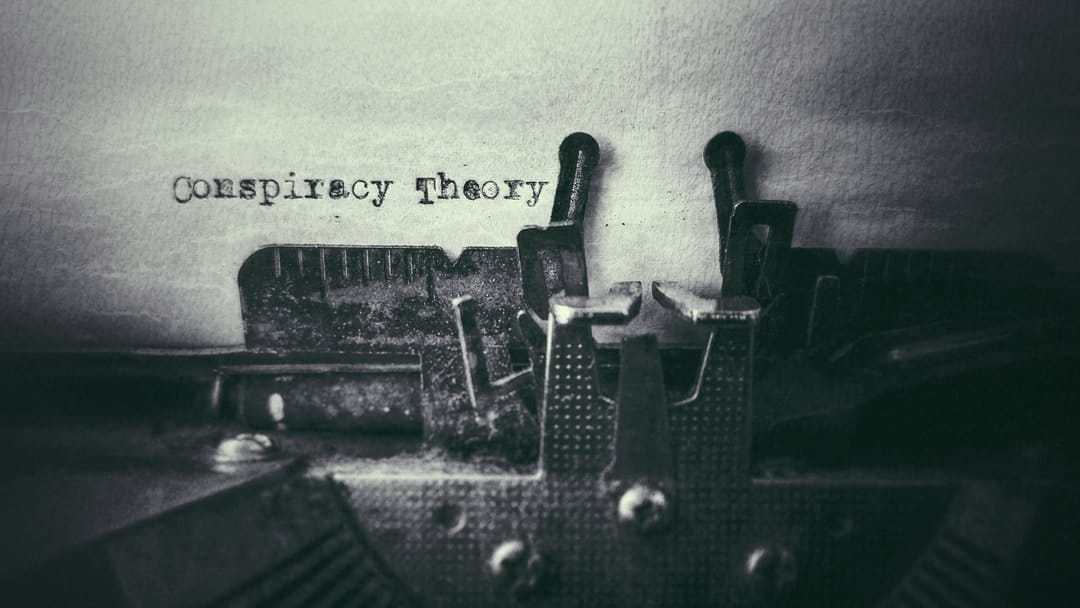
Conspiracy theories, generally speaking, can be understood to be "the belief that an organisation made up of individuals or groups was, or is, acting covertly to achieve some malevolent end".
They can appear, in many cases, to be harmless enough, often tangled within popular culture. Is La Toya Jackson just her brother in disguise? Could Elvis Presley or Tupac actually still be alive? These kinds of questions are just the tip of the conspiracy theory iceberg.
However, some are far more menacing. Conspiracy theories can be downright dangerous. Notable examples are those that are pedalled by the far right.
The far right has a dark and extensive history with conspiracy theories, several of which have found support in Australia.
Brendan Fay discusses how Joseph Goebbels, Reich Minister of Propaganda in Nazi Germany, used the Ministry of Propaganda to spread conspiracies and misinformation about the international reach and influence of Jewish power, infamously through many mediums, including films such as Der ewige Jud (The Eternal Jew) and Jud Süss (Jew Süss).
These conspiracies played a significant role in spreading antisemitism in Germany and Europe, as well as justifying the Holocaust.
Sadly, conspiracy theories about the Jewish people have not vanished – the Zionist Occupational Government (ZOG) conspiracy theory is still alive and well. Stephen Vertigans explains that adherents to the ZOG conspiracy theory believe Jewish powers control the Western states, including the United Nations, the United States federal government, financial systems, and the media.
The 20th century saw the ZOG conspiracy theory find support in Australia.
Eric Butler (founder of the Australian League of Rights, a far-right and antisemitic political organisation), attempted to expose what he considered to be the Jewish-orchestrated "New International Economic Order". In this process he openly promoted documents like The Protocols of the Elders of Zion – a fabricated and deeply antisemitic text, first printed in 1903, describing a Jewish plan for world domination, often associated with the ZOG conspiracy theory.
But Jewish people aren't the only targets of far-right conspiracy theories.
Both Reza Zia-Ebrahimi and Jelle van Buuren discuss "Eurabia", a term popularised by British author Bat Ye’or, which is a conspiracy theory claiming there's a deliberate, orchestrated Islamisation process of Europe, approved by the highest European political authorities.
Bat Ye’or’s writing has had horrific impact – it was directly quoted extensively in the manifesto of the perpetrator of the 2011 Norway attacks, which resulted in the deaths of 77 mostly young people. The term "Eurabia" occurs 171 times throughout the manifesto.
Notably, the displacement and replacement of a white population by a foreign "invasion" is something of a trope within far-right conspiracy theories.
The Great Replacement is another Islamophobic conspiracy theory, developed by French intellectual Renaud Camus, which claims that the white French population is being replaced by non-Europeans, specifically Arabic, African and Muslim people, with the knowledge of a complicit or collaborative group of elites.
The Great Replacement has been called a "softer version" of another far-right conspiracy theory known as the white genocide (also known as "white extinction", or "white replacement"). Popularised by David Lane (the infamous white supremacist, convicted felon and author of White Genocide Manifesto), this conspiracy theory claims that the white race is being directly and deliberately endangered as a result of society being subject to increased cultural diversity and racial integration, among other factors.
White genocide conspiracy theories have also had horrific impacts. The perpetrator of the 2019 Christchurch shooting, a young Australian man who massacred 51 people in two mosques in Christchurch, New Zealand, referenced The Great Replacement conspiracy theory in the title of his manifesto: The Great Replacement: Towards a New Society.
Several other far-right terrorists have made direct reference to a white genocide or great replacement, including the perpetrator of the Pittsburgh synagogue shooting in 2018, the perpetrator of the 2019 El Paso shooting and the perpetrator of Poway synagogue shooting in 2019.
Closer to home
Australia has also seen its own versions of white displacement and replacement far-right conspiracy theories.
"The Grand Plan – Asianisation of Australia" was a conference paper written by political researcher Denis McCormack. It was presented in July 1996, at the 20th Anniversary Conference of the Asian Studies Association of Australia, hosted at La Trobe University, and then, later that year, presented to the Australian House of Representatives by then MP for Kalgoorlie, Graeme Campbell. In his paper, McCormack made the claim that there was an ongoing grand plan, orchestrated by the elites, to bring about the Asianisation of Australia through mass Asian immigration.
Shortly after, in 1997, Pauline Hanson made similar, conspiratorial claims in her book Pauline Hanson: The Truth. It detailed a deliberate plot to destroy Anglo-Saxon Australia, executed by "the internationalist elite of he New World Order", and carried out through "immigrationism, multiculturalism, Asianisation and Aboriginalism".
The book also referred to "the Aboriginal Question", claimed Aboriginal Australians were cannibalistic, criticised advocates of gun control, and made a prediction that by 2050 Australia would be run by an Asian lesbian cyborg (seriously, Google it).
Hanson has since distanced herself from the book, claiming she didn't write it, but rather it had been compiled by four anonymous strangers.
But where does that leave us now? Are far-right conspiracy theories still present in Australia today?
Regrettably, yes, and there are concerns that they're growing.

The COVID-19 pandemic has had a clear impact on the popularity and promotion of conspiracy theories. New theories have developed specifically about the pandemic. Some claim that COVID-19 doesn’t exist, that the death rates are being inflated, or that it's being manipulated by a "deep state" of America’s elites.
Interestingly, several existing conspiracy theories have grown in prominence, including conspiracies about 5G, vaccinations, and child abuse and paedophilia.
Recent research has shown that groups have "retrofitted" their conspiracy theories to COVID-19. For example, anti-vaccination groups (anti-vaxxers) have claimed that COVID-19 is a cover for a plan orchestrated by Bill Gates to implant trackable microchips into the general population through mandatory vaccines.
Many of these conspiracy theories manifested in numerous protests across Australia in 2020, most of which promoted "personal freedom" and deplored state-sanctioned lockdowns.
This civil unrest is something that's not gone unnoticed, or unappreciated, by the Australian far right. They've taken the anti-state sentiment of the lockdown protests, and used it to promote their own political agenda, ASIO noting that these attitudes communicated at lockdown protests match far-right narratives that "paint the state as oppressive, and globalisation and democracy as flawed and failing … [and] the inevitability of societal collapse and a 'race war'".
Additionally, it's been discovered that there have been messages posted on COVID-19 conspiracy forums that have contained links to white supremacist forums that place blame on China and Chinese people for the COVID-19 pandemic – a blatant attempt to try to disseminate xenophobic anti-China ideology and propaganda.
So, what can we learn from observing the role that far-right conspiracy theories have, and continue to, play in the promotion of misinformation, and the generation and spread of hate and intolerance?
We can learn, and reinforce, that as a community, we should be concerned about, and question, any claims or ideologies that purport fact without credible evidence. Conspiracy theories fall firmly within this category, and should be addressed accordingly.
In times of great uncertainty, placing renewed importance on developing informed opinions based on rigorous scientific research is of the utmost importance.





